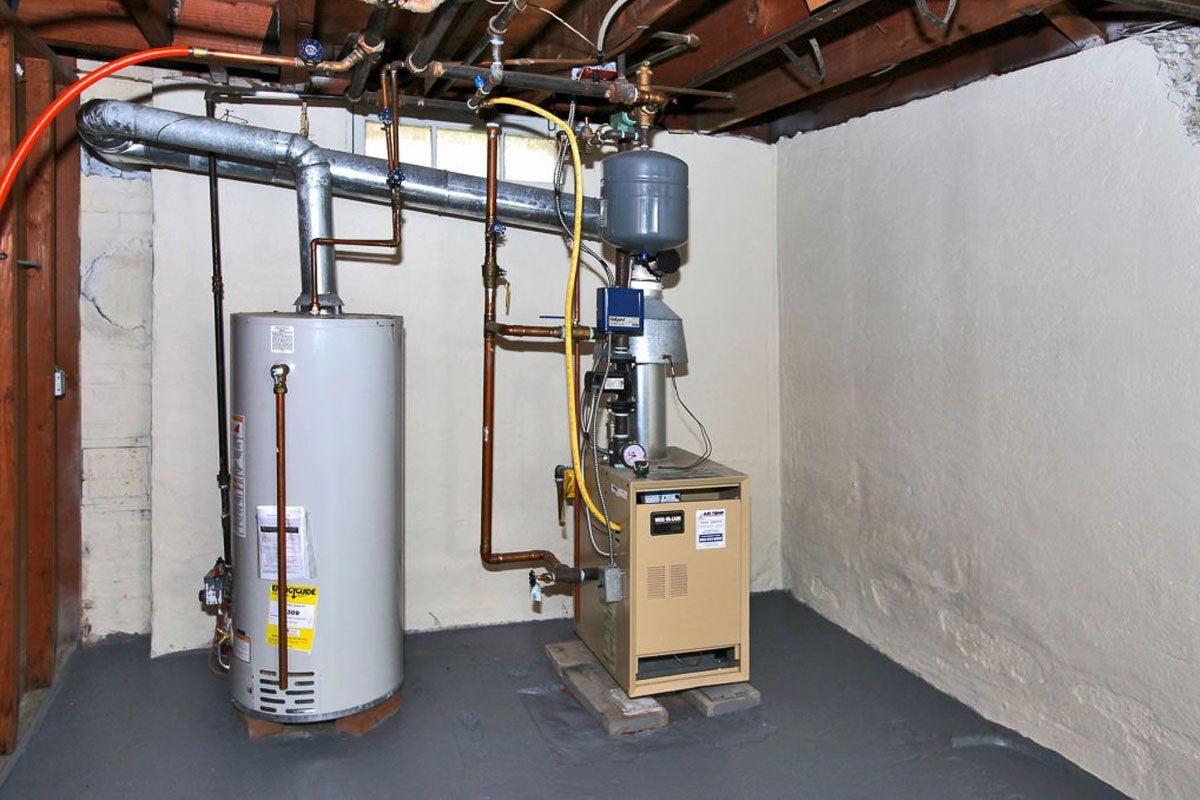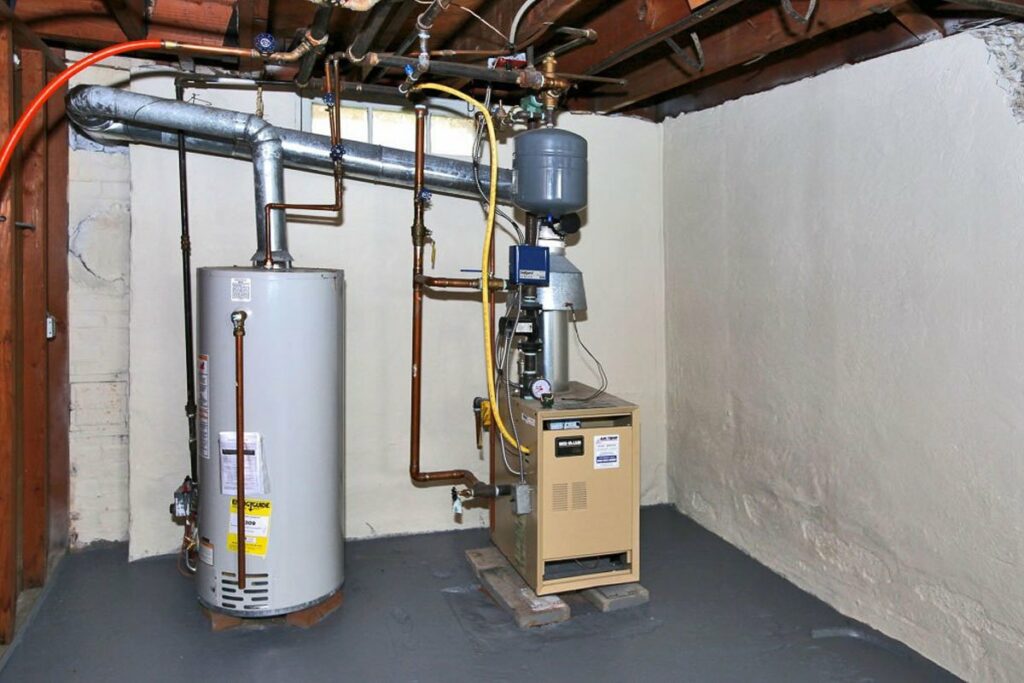When it comes to the question of whether a boiler is HVAC or plumbing, the answer may surprise you. While boilers are often associated with heating systems, they actually fall under the realm of plumbing. Boilers are responsible for heating water, which is then distributed throughout a building for various purposes, such as heating and providing hot water. So, while HVAC systems typically deal with air conditioning and ventilation, boilers fall more in line with the plumbing domain.
To understand the significance of boilers within the plumbing industry, it’s helpful to delve into a bit of history. Boilers have been used for centuries, dating back to ancient civilizations that harnessed the power of steam. In modern times, boilers have evolved to be more efficient, reliable, and versatile. In fact, they are an essential component of many residential and commercial plumbing systems, providing warmth and comfort to countless buildings. With their ability to heat water effectively, boilers play a crucial role in ensuring the proper functioning of plumbing systems and contribute to overall energy efficiency. With advancements in technology, boilers have become even more environmentally friendly and energy-efficient, offering a reliable solution for heating needs.
Boilers fall under the category of HVAC (Heating, Ventilation, and Air Conditioning) systems. While they are an essential part of a plumbing system, boilers are primarily responsible for providing heat to a building by heating water and distributing it through pipes and radiators. They work in tandem with the plumbing system but are distinct in their functionality. So, to answer the question, boilers are classified as HVAC systems and should be handled by professionals with expertise in HVAC operations and maintenance.

Understanding the Relationship Between Boilers, HVAC, and Plumbing
When it comes to heating systems, boilers play a crucial role in providing warmth and comfort to our homes and buildings. However, there is often confusion about whether boilers are classified as HVAC (heating, ventilation, and air conditioning) systems or plumbing systems. To clear up this confusion, we need to delve into the function and components of boilers, as well as their connection to HVAC and plumbing systems.
The Function of Boilers
Boilers are heating systems that generate heat by heating water or producing steam, which is then circulated throughout a building to provide warmth. They can be powered by various energy sources, including gas, oil, electricity, or even biomass. Boilers are commonly used in residential, commercial, and industrial settings.
Components of Boilers
A boiler consists of several key components that work together to heat the water or produce steam:
- Heat Exchanger: This transfers heat from the energy source to the water or steam.
- Burner: It ignites and burns the fuel to generate heat.
- Combustion Chamber: This is where the fuel is burned.
- Pump: It circulates the water or steam throughout the system.
- Expansion Tank: It allows for the expansion of water as it heats up.
- Controls: These regulate the temperature and pressure of the system.
Boilers and HVAC Systems
Although you might associate HVAC systems with air conditioning and ventilation, heating is also an essential component. In the context of HVAC, boilers are considered part of the heating system. They work alongside other HVAC components such as air conditioning units, heat pumps, and ductwork to provide a complete heating and cooling solution for a building.
Boilers in HVAC systems are responsible for generating heat and distributing it throughout the building. They can be connected to radiators, baseboard heaters, or underfloor heating systems to transfer the heat effectively. By incorporating boilers into HVAC systems, buildings can maintain optimal temperature control and comfortable indoor environments.
The Relationship Between Boilers and Plumbing Systems
Boilers and plumbing systems are closely connected in the context of heating. Plumbing systems refer to the network of pipes, valves, fixtures, and fittings that distribute water throughout a building. Boilers are responsible for heating the water used in plumbing systems, whether it is for hot water taps, showers, or other appliances.
Integration of Boilers in Plumbing Systems
Boilers are an integral part of plumbing systems as they provide the necessary heat for hot water. They connect to the plumbing network through a water supply line, which allows them to heat and distribute water. The heated water or steam produced by the boiler is then sent to different areas of the building, where it is used for various purposes, including bathing, cooking, and cleaning.
In addition to heating water, boilers also contain safety features, such as pressure relief valves and temperature controls, to ensure the efficient and safe operation of the plumbing system. They are designed to provide a constant supply of hot water and maintain a consistent temperature for optimal comfort and convenience.
Connecting the Dots: Boilers, HVAC, and Plumbing
Understanding the relationship between boilers, HVAC, and plumbing systems is essential to grasp their interconnected roles in heating and providing hot water. Boilers are an integral part of both HVAC and plumbing systems.
Within an HVAC system, boilers serve as the heating component, generating warmth that is distributed throughout the building via various heating devices. In plumbing systems, boilers play a central role in heating the water used for showers, taps, and other domestic needs.
Is Boiler HVAC or Plumbing?
When it comes to classifying a boiler system, the question often arises: is it HVAC or plumbing? The answer lies in understanding the functionalities and purposes of each.
Boilers are primarily associated with heating homes and can be categorized under HVAC (Heating, Ventilation, and Air Conditioning) systems. They are responsible for generating and distributing heat throughout a building, which falls under the heating aspect of HVAC.
However, boilers are also closely related to plumbing systems due to their vital role in supplying hot water. They heat water and circulate it through pipes to various appliances and fixtures in a building, including faucets and showers.
Therefore, boilers can be seen as a crossover between HVAC and plumbing. While their primary function aligns with HVAC heating, their involvement in water supply links them to plumbing as well.
In summary, boilers can be classified as both HVAC and plumbing systems due to their dual role in heating and providing hot water. This dual functionality makes boilers crucial components in residential and commercial settings, ensuring comfortable indoor temperatures and hot water supply for various daily activities.
Key Takeaways
- A boiler is not part of the HVAC system, but it is considered a part of the plumbing system.
- Boiler systems are used for heating water and distributing heat throughout a building.
- Plumbing systems handle the distribution of water and drainage in a building.
- HVAC systems are responsible for heating, ventilation, and air conditioning.
- While boilers and HVAC systems work together to provide comfort, they serve different purposes in a building.
Frequently Asked Questions
Many people often wonder if a boiler is considered HVAC or plumbing. In this section, we will answer some frequently asked questions to provide clarity on this topic.
1. What is the difference between HVAC and plumbing?
HVAC stands for heating, ventilation, and air conditioning. It involves systems that control the temperature, airflow, and quality of indoor air. Plumbing, on the other hand, deals with the installation, repair, and maintenance of water supply and drainage systems. While HVAC and plumbing can sometimes overlap, they are distinct fields with different areas of expertise.
Boiler systems are primarily associated with heating and are part of the HVAC category. However, they also involve plumbing aspects as they require water supply and connect to a network of pipes for distribution. This is why boilers bridge the gap between HVAC and plumbing.
2. Is a boiler considered HVAC?
Yes, a boiler is considered part of the HVAC system. HVAC encompasses both heating and cooling systems, and boilers fall under the heating category. Boilers use heat to generate steam or hot water, which is then distributed throughout the building to provide warmth. So, if you are referring to the heating aspect of HVAC, boilers are certainly a part of it.
3. Is a boiler considered plumbing?
While a boiler does have plumbing aspects, it is not solely considered plumbing. Plumbing typically refers to water-related systems such as piping, fixtures, and drainage. Boilers are connected to plumbing systems as they require a water supply and often use pipes to distribute heat. However, the term “plumbing” is more commonly associated with water supply and drainage rather than heating systems.
4. Can a plumber work on boilers?
Yes, plumbers can work on boilers as they have knowledge and expertise in dealing with water-related systems. However, it’s important to note that not all plumbers may be experienced in handling boilers. Boilers have specific components and require specialized skills for installation, repair, and maintenance. It’s advisable to hire a plumber who has experience in working with boilers or consult a heating specialist for any boiler-related issues.
5. Do HVAC technicians work on boilers?
Yes, HVAC technicians are trained to work on boilers as part of their expertise in heating systems. They have knowledge of the components, wiring, and controls of boilers, allowing them to perform installation, repair, and maintenance tasks. If you have any concerns or issues with your boiler, contacting an HVAC technician would be a suitable option.
Boiler Training Class, Parts, Operation, Zoning, Explained!
In conclusion, a boiler is an essential part of both HVAC (heating, ventilation, and air conditioning) and plumbing systems.
While the primary function of a boiler is to heat water, it plays a vital role in both HVAC and plumbing applications. In HVAC systems, a boiler is responsible for heating the air that circulates throughout a building. In plumbing systems, boilers are used to heat water for various purposes, such as showers, sinks, and radiant heating systems. Therefore, it is accurate to say that a boiler is a component of both HVAC and plumbing systems.

